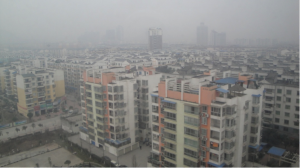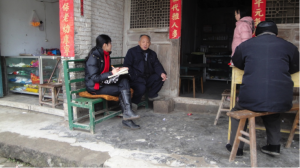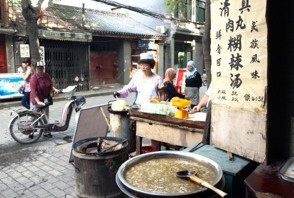Encountering officials is inevitable in many research projects in China. The encounter itself shows a snapshot of how local officialdom works. Being rejected by the officials, being unable to find the officials during office hours, being passing like a ball from one office to another, and being scolded or humiliated were normal occurrences for ordinary people in dealing with local officials. ‘In a meeting’ was a frequently named excuse by officials to avoid unwelcome visits. Encountering Chinese officials thus put challenge on researchers to get needed information, to interpret meanings behind words, and to explore complex relationships behind certain phenomenon. But the encounter itself constitutes a significant part of the research ‘field’. This post proposes carefully reflecting the laborious process of encountering government bureaus and officials to deepen our understanding of the local social world, writes Jiong Tu.
My PhD project explores people’s moral experience of health care transformations over the past decades in a county in eastern Sichuan, China. In the field from 2011 to 2012, I met many patients and health professionals through acquaintances’ introductions without much difficulty. People sincerely shared with me their concerns and worries as health care increasingly became a troubling issue. I also interviewed dozens of health administrators and officials in order to get a view from within the structure of the authority with respect to the health policy agenda and administration. Perhaps because I went back to my ‘hometown’ for fieldwork and my topic is not politically sensitive, I experienced neither intervention that many western researchers encountered in China (such as that depicted in an earlier post of this blog by Lisa Richaud), nor the fear and scare depicted in Mayfair Yang’s fieldwork in Beijing (Yang 2004) and in Yunpeng Zhang’s fieldwork in Shanghai (see this previous post here). But my encounters with local officials were frequently disturbing, dramatic and sometimes humiliating.
Politics at the bottom of bureaucratic structure

In 2009 when I first did my master thesis research in the county, I naively went directly to local health office to ask for some data. There I was ruthlessly rejected by the officers, who responded to me in a scolding tone that I did not know even the basic social rule. ‘How could you come directly to a government office to ask for information?’ they responded. They said that I should at least ask some acquaintance to make a reference call to them, or else how could they know who I actually was, even though I had showed them my student card and a reference letter from university. As a native who spoke local dialect and appeared to be just an ordinary local young person, they simply rejected me. That time I did not get any information. The encounter several years ago gave me a lesson how I ‘should’ interact with government officials in a conservative interior county.
When I did research in this county again in 2011, I always tried to find some acquaintance to introduce me to local health administrators and officials. With the introduction of a reliable acquaintance, many administrators and officials appeared to be kind, sincere and outspoken during interview. Some of them further introduced me to their subordinates. Even so, I still met many obstacles in interacting with officials.
In 2011, before I went to the same health office that rejected me in 2009, I made sure an acquaintance from local health sector had made a call to them and booked an appointment with the office head. But when my acquaintance accompanied me to the office at the appointment time, nobody was there except two female assistants who cautiously suggested us to call their leader again. My acquaintance called the office head’s mobile phone and was told he was in a meeting outside the county, thus we rescheduled our meeting to the afternoon. In the afternoon when we came to the office again, still only the two female assistants were there. While waiting in the office, I chatted with the two staff members. They began to talk about their daily work and expressed their views about local health to me. About fifteen minutes later, one of the staff member’s mobile phone rang. One of the staff members went out to answer the phone. When she came back, she told us the office head was not in the county and would not be able to meet with us. After this, their attitude changed and they terminated our conversation. No matter what I asked, they responded with a cold and simple ‘I don’t know’. Being suddenly treated in a hostile manner, we could do nothing but leave the office. The dramatic change puzzled me. Later I communicated my experience with several people working in local health sector, and got more information about the office I visited. The former head that rejected me in my 2009 visit was removed from his post after a serious medical accident happened in a private clinic under his jurisdiction in 2010. The new head was extremely cautious about every possible incident during his tenure, thus refused to talk with a western-trained young researcher, whom he considered one of the possible dangers.

Many locals explained that normally the top officials who really had power (within their institution) would have more courage and foresight to talk with a young researcher. But it was exactly these officers at the low echelon of government bureaucracies, who carried out daily administrative work, extremely cautious in dealing with ‘outsiders’ and scared of being blamed for saying the worry words. Correspondently, the best way to avoid being blamed by their superiors was to avoid meeting a possible ‘trouble-maker’ at all.
However, these officials at the bottom of formal political structure are exactly whom most ordinary people encounter in daily life and through whom people come to experience the state bureaucratic apparatuses. As many of my local interviewees expressed, being rejected by officials, being unable to find officials during office hour, being passed like a ball from one office to another, and being scolded or humiliated were normal occurrences for them. ‘In a meeting’ was a frequently named excuse by officials to avoid unwelcome visits. They constitute the routine practices of local bureaucracies. Local people explained to me, as a student studying abroad with the introduction of local informants, I was treated much better by local officials than ordinary people who had no (special) background and no connection. These mundane bureaucratic practices shape people’s sense of the distance between ordinary people and local officials. Over time I began to understand why in people’s discourse there was a clear ‘us-versus-them’ conceptualisation, in which local officials were seen as the main antagonists of the people. Local officials’ spatial inaccessibility, bureaucratism, and formalism in daily work contributed to this antagonism.
Politics outside office
There are many interesting phenomena in local officialdom. The heads of government offices and public hospitals were frequently not at their office in the afternoon, thus most of my interviews with administrators and officials were carried out in the morning. The morning should not be early morning or near noon, but at the time between 9:30 to 11:30 am. In the afternoon many officials and administrators might go out to socialise in tea house, in mahjong rooms, at lunch or a dinner table, where many formal works were manoeuvred. These activities frequently lasted till late night when large amount of alcohol beverages had been consumed. It made some officials unable to get up early in the morning and have to work later than normal office hours. In several occasions, I arrived at the offices at 8am in order to meet the officials once they arrived and get the interview done before they started their busy schedule of the day, but ended waiting outside the offices for hours with other early birds who had the same idea as me. During interviews, many officials complained about the endless yingchou – the social interactions and receptions involving feasting, toasting and entertainment. But in order to reconcile conflicts in work and to connect guanxi with government departments, they had to put a large amount of time and energy in yingchou. The struggles of administrators and officials in health sector show the struggles of many low and middle echelons of government bureaucrats who face intense pressures from higher level government, encounter challenges in coordinating various departments in the middle, and have to respond to demands from below.
Interviewing administrators and officials at the low echelon of officialdom, I was frequently asked ‘do you want to hear the official words or the true words?’ The true words are the words shared among trusted acquaintance privately, but are not spoken publicly. The true words criticise the misbehaviours, corruption and irresponsibility of government, while the official words praise the glory, success, bright side of social development. Officials are extremely careful about what to say or not to say in particular time and location. Although I believe that most interviewees tried to communicate their true feelings and genuine thoughts (after introduction through local acquaintance), the question of ‘official words or true words’ itself suggests the division between the private self and the official self among these low echelon officials. Contemporary Chinese society seems to be characterised by these divided-selves and contradictions, which challenge the researcher to figure out the subtle differences and to show a nuanced picture of people’s views and experiences.
Subtle power struggle
At a different time, I did an interview in the health professional training centre based in a local hospital. I heard about the centre when interviewing the health bureau chief – the top official in local health sector. I requested to visit the centre and carried out the interview there. The chief agreed and made a phone call to introduce me to the office head at the centre. In the afternoon I came to the centre and met the middle-aged female head. The interview went well until half hour later a woman in her early 50s came to the office and started to work at the desk opposite to the head. The head simply introduced her to me as an officer there, and told her I was a PhD student introduced by the bureau chief. When the interview resumed, I began to find myself in trouble. No matter what question I asked, before the head answered, the newly arrived staff would comment. Sometimes she blatantly said I asked very stupid question, sometimes she blamed me for not even understanding basic concepts in their work. In the field, I did ask many ‘stupid’ questions, sometimes in order to hear explanations from locals’ own words, sometimes because I was not familiar with medical terminologies. Normally at the beginning of interviews I would explain to the interviewees (especially health professionals) about my limited medical knowledge, most interviewees then kindly answered my questions with great patience when coming to special medical cases. I did the same at the beginning of this interview, but since the elder staff came in, she began to complain sarcastically about my lack of knowledge even though I was a ‘PhD student’, she emphasised.
In the following twenty minutes, although I sat in front of the head’s desk, the interview became a tug between the elder staff and me. The office head could hardly speak anything in front of the elder staff’s criticism of me, and I became more and more frustrated and humiliated. At last, when I could not think about one more question to ask in the presence of the elder staff, I asked the head if she could introduce me to visit some other offices in the hospital. The head immediately agreed and led me out of their office. I was puzzled by the presence of the elder officer that day. Later I discussed my experience with several acquaintances working in the local health sector, and got to know the elder officer was the wife of former health bureau chief who was replaced by the new chief just a year ago. When the office head accidently mentioned that I was introduced by the new chief to the office, I naturally became the target of resentment the wife had towards the new health bureau chief (although I did not have any personal relationship with the bureau chief). She intentionally interfered with the interview so that I could not get any useful information in her presence. The office head, although held higher position officially, was junior in front of the elder staff that had worked longer and had much more power and connections as the wife of the former health bureau chief. The office head could not rebut the elder staff’s criticisms of me, except saving me from further humiliation by introducing me to another office. Unexpectedly I was involved in the subtle power struggle in local politics.
Reflecting the encounter as part of the ‘field’
In the field, a researcher frequently constitutes the local society he or she tries to figure out, and is easily involved in a much larger and subtle power struggle willingly or not. The researcher could become a tool of politics, constitute part of local propaganda (to publicise local music culture in the case of Catherine Ingram in this earlier post), or become the target of avoidance or surveillance. Officials may speak certain words in specific context and time, and provide particular information but not others to influence the perspective of the researcher. Ordinary people also become increasingly conscious to use the influence of media and researchers to express their opinions when there are few formal channels to make their voices be heard. In my field, patients told me endlessly about their unhappy experiences with health care and their individual stories of being defrauded by hospitals and doctors, in the hope that my research could warn other patients from falling into a similar trap or get somebody from higher up to correct the local wrongdoing. Doctors practically express their views in the hope that my research could help them solve their issues or deliver their appeals to a higher level authority (e.g. village doctors’ appeal for pension).
In his contribution to this blog, Yupeng Zhang showed how he used his contacts to help petitioners. Yet in the field where I struggled in interacting with officials, I frequently found myself not doing much more to patients and doctors than lending a sympathetic ear or giving some simple policy advice. There was a gap between researcher and locals in terms of expectations and understandings of research. The awkward positions of both the local people and the researcher were defined by the current modes of governance, of policy making, and of politics. And these governance, policy making and politics are exactly what constitute the ‘field’. As Shore and Wright suggests, it needs ‘a radical reconceptualisation of ‘the field’; not as a discrete local community or bounded geographical area, but as a social and political space articulated through relations of power and systems of governance’ (Shore & Wright 1997:11). Researchers of Chinese society often have to learn to interact with officials. The encounter itself shows a profile of how local officialdom works, constitutes a significant part of the research of policy and governance.
My experience is filled with puzzlement and limited to the officialdom of an interior county, which may function quite differently from other places in China. Nevertheless it epitomises the complex relationships and subtle power struggle generally existing in Chinese officialdom. Facing the ‘wordsmithing’ (Schoenhals 1992) in Chinese politics, researchers need to interpret meanings behind official words. To understand various ‘strange’ encounters in local officialdom, researchers again need to try to figure out the complex relationships and power struggles behind the scene. Yet the process itself poses challenge to the researcher who needs to cultivate relationship, to familiarise oneself with a local society, and to get insider’s knowledge. The process is frequently laborious and time-consuming. But it is one of the ways for the researcher to experience the local social world, and to carefully reflect upon that which would deepen our epistemological understanding of the ‘field’ not only in China but also in other parts of the world.
References
Schoenhals, M. (1992) Doing Things with Words in Chinese Politics: Five Studies.Berkeley: Institute of East Asian Studies, University of California.
Shore, C.and Wright, S. (eds.) (1997) Anthropology of Policy: Critical Perspectives on Governance and Power. London and New York: Routledge.
Yang, M. M. (1994) Gifts, Favors, and banquets: The art of Social Relationships in China. Cornell University Press.
About the author
Jiong Tu is a PhD candidate in the Department of Sociology, University of Cambridge. Her work explores people’s moral experience of China’s health care transformation over the past decades. The research involves interviews with many patients, health professionals, hospital administrators and health officials in a county in Sichuan Province. Her PhD is expected to be completed in 2014.
For citation: Tu, J. (2014) Encountering Chinese officials: bureaucratism, politics and power struggle. Field Research Method Lab at LSE (21 October 2014) Blog entry. URL: https://blogs.lse.ac.uk/fieldresearch/2014/10/21/encountering-chinese-officials






1 Comments